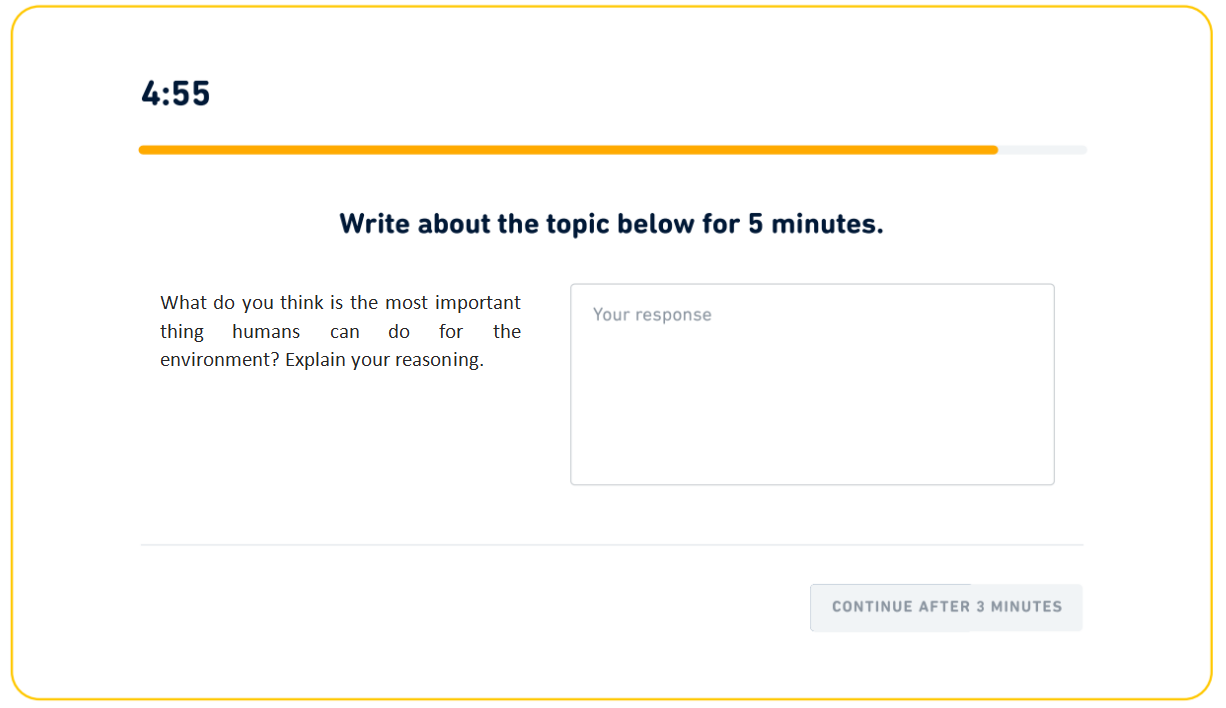10 Advanced Vocabulary for “Writing Sample” in the Duolingo English Test - Natural Environment Protection
This blog post discovers 10 advanced environmental vocabulary words for the Duolingo English Test. Learn key terms with definitions and examples to enhance your writing on topics like sustainability and conservation.
| Writing Sample | Personal Experience |
|---|---|
| Culture and Society | |
| Assumed Situation | |
| Historical and Cultural Reflection | |
| Ethics and Morality | |
| Technology | |
| Relationships and Communication | |
| Career and Finance | |
| Travel and Leisure Activities | |
| Physical and Mental Health | |
| Creativity and Imagination | |
| Problems and Decision-Making | |
| Faith and Values | |
| Natural Environment Protection | |
| Psychology and Emotions | |
| Friendship | |
| Education and Learning |
Advanced Vocabulary List and Applications
1. Carbon Footprint
Definition: The total amount of greenhouse gases emitted directly and indirectly by an individual, organization, or product, measured in units of carbon dioxide equivalent.
Example: Reducing one’s carbon footprint can significantly contribute to environmental protection efforts.
Usage Tip: Use this term when discussing the impact of various activities on climate change.
2. Biodiversity
Definition: The variety of life in the world or in a particular habitat, often considered essential for ecosystem health.
Example: Biodiversity is crucial for ecosystem resilience and the provision of ecosystem services.
Usage Tip: Use this term to highlight the importance of variety in species and ecosystems.
3. Ecosystem
Definition: A biological community of interacting organisms and their physical environment.
Example: Urban development can drastically alter local ecosystems, threatening wildlife.
Usage Tip: This term is effective for discussing the interdependence of organisms and their environments.
4. Pollution
Definition: The introduction of harmful substances or products into the environment.
Example: Air pollution from vehicles poses significant health risks to urban populations.
Usage Tip: Use this term when addressing environmental degradation caused by human activity.
5. Renewable
Definition: Resources that can be replenished naturally over time, such as solar, wind, and hydro energy.
Example: Investing in renewable energy sources is essential for reducing dependency on fossil fuels.
Usage Tip: Use this term when discussing sustainable energy solutions that have little environmental impact.
6. Habitat Preservation
Definition: The protection and maintenance of natural habitats to ensure the survival of species.
Example: Habitat preservation initiatives are vital for maintaining biodiversity in threatened areas.
Usage Tip: Use this term when focusing on strategies to protect natural living spaces.
7. Climate Change
Definition: Long-term alterations in temperature, precipitation, and other atmospheric conditions on Earth.
Example: Climate change is leading to more frequent and severe weather events worldwide.
Usage Tip: This term is crucial when discussing global environmental challenges.
8. Sustainability
Definition: The ability to be maintained at a certain rate or level, particularly in relation to environmental balance.
Example: Sustainability in agriculture ensures that resources are available for future generations.
Usage Tip: Use this term when discussing practices that promote long-term ecological health.
9. Environmental Stewardship
Definition: The responsible management and care of the environment and its resources.
Example: Environmental stewardship encourages communities to engage in sustainable practices.
Usage Tip: Use this term when discussing the role of individuals and organizations in protecting the environment.
10. Conservation
Definition: The act of preserving, protecting, or restoring the natural environment and wildlife.
Example: Conservation efforts have helped to protect endangered species from extinction.
Usage Tip: This term is useful when referring to activities aimed at safeguarding the environment.

Sample Answer:
One of the most crucial actions humans can take for the environment is to embrace sustainability. By utilizing renewable energy sources, we can drastically reduce our carbon footprint and combat climate change. Furthermore, supporting conservation initiatives is vital for protecting biodiversity and maintaining healthy ecosystems. Each individual has a role in practicing environmental stewardship, ensuring that we safeguard our natural resources for future generations. Collectively, these efforts can create a significant positive impact on our planet.
Further Reading:
l 10 Advanced Vocabulary for “Writing Sample” in the Duolingo English Test - Faith and Values





